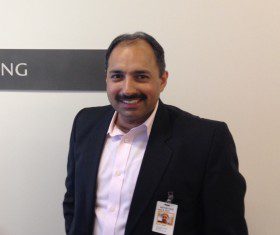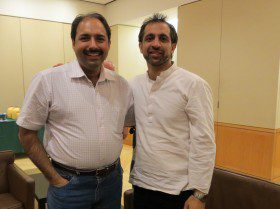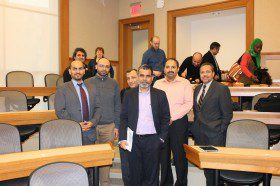During his time as a SAI Research Affiliate, Mumtaz Anwar has used Harvard’s resources to develop his research on the expansion of postsecondary education in South Asia, and he has attended classes, lectures, and conferences that have opened his eyes to new forms of learning.
SAI’s research affiliate program brings researchers and faculty to Harvard each year whose area of interest is South Asia. Anwar is under the mentorship of Asim Khwaja, Sumitomo-FASID Professor of International Finance and Development, Harvard Kennedy School, while at Harvard, and he is also a research fellow at Hamburg Institute of International Economics (HWWI), Germany, along with his permanent position of assistant professor in the Department of Economics, University of the Punjab, Lahore, Pakistan.
SAI recently talked to Anwar to learn about the progress he has made on his research while at Harvard:
Q: Can you talk a little bit about your research and what you’ve been doing while at Harvard?
Mumtaz Anwar: I am working on two issues here. One is expansion of postsecondary education in South Asia and developing countries. There has been a lot of expansion in postsecondary education in all developing countries in last two decades, and I am focusing mostly on South Asia and Pakistan. For example, in Pakistan, in 2002, there were only 35 public and private sector universities, now there are nearly 200. So there has been a lot of expansion in postsecondary education. First off, what I’m looking at is what are the determinants; whether it is due to economic expansion; whether it is due to social pressure; whether it is due to more young people coming in; and some political factors as well. Secondly, while a lot of expansion has happened in the last 2 decades, at the same time there are a lot of quality problems coming in. There are a number of students who couldn’t be admitted to universities before, but are now coming in with easy admissions into the universities and higher education institutions, which needs analysis.
The second aspect which I am working on is the relationship of higher education with the job market. For example, look at the Middle East, A lot of people are saying that the Arab uprising is due to a problem where young people have education, but they are not getting jobs. So what I am looking at in South Asia is that how in Pakistan, where 65 percent of the population is composed of young people, this issue can be addressed. So if they are going into post-secondary education, what will happen with them after? Will they be able to find jobs? Will they get a job according to their degree and qualifications? The problem is that people may be getting jobs, but these jobs are not according to their qualification and experience. So instead of getting out of the poverty trap, they are going into it. So this is the second aspect I am researching while here [at Harvard].
All in all, I am interested in the expansion in postsecondary education and human development in South Asia and particularly in Pakistan. Under the Millennium Development Goals (MDGs), there was a lot of funding for the primary and secondary education but very little funds has been allocated to higher education. What I am looking at is whether these international donors should also consider higher education as well. So I am looking at all these aspects of postsecondary expansion, its role in the labor market, and then a policy proposal for the international donor agencies.
Q: And how has working with Asim Khwaja [Harvard Kennedy School] helped your research and how have you learned from him while at Harvard?
MA: It’s fantastic. He basically gave me a new direction in my research, and it has been very interesting for me, because what I was doing in political economy and development policy, which is my main area of research, has been given a new direction because of Harvard. The time I have spent here has changed my whole frame of mind. This research has opened new avenues. For example, I never knew about the new methodologies of research, like RCTs (Randomized controlled trials). So I learned it here, and now I am going to practice it as well. Asim [Khwaja] helped me by motivating me and he encouraged me to learn these tools as well.
I audited a few classes at the Harvard Kennedy School and MIT. In these courses, I learned a lot about how to do research, and current research practices. What I did in my old research now seems old and traditional. Here, I have learned so many new things.
Q: How has your time at SAI as a research affiliate influenced your research? I know you have been to a lot of SAI events and have met a lot of people who have influenced your research.
MA: It has been amazing for me, really. I spent four years in the UK, and 3 years in Germany, have traveled around the world, so this is my seventh university altogether. I have studied in four universities, have worked in two universities, and have been a visiting fellow. At SAI, and at Harvard, I have seen debates and intellectual discussions that are going on here, which has no parallel and that is amazing. It means people are exchanging their views, they are debating the issues, and by that, you are learning new things as well, and more innovative things as well- more current research, more visionary ideas. What will happen next? That is something different, that each and every kind of group can have views, and can express freely. I have participated in a number of activities [classes and lectures at Harvard and in the area], and this has given me, on a whole, a broader scope of learning.
Q: After your time at Harvard, what do you intend to do?
MA: After Harvard, I plan to work with Asim [Khwaja], to design an experiment and return to Pakistan to develop policy guidelines for better quality higher education in Pakistan, and an improvement of higher education in all of South Asia.
This interview has been lightly edited for clarity and length.



